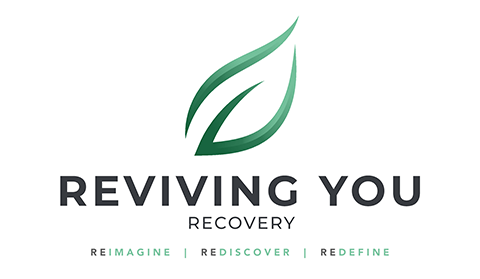
Alcohol Addiction
No matter where you are in your journey, our team is here to help you rediscover your strength and reclaim your life.

What is Alcohol Use Disorder?
Alcohol addiction is a truly insidious condition that brings about profound changes in a person’s life. It is a compulsive, chronic disorder that relentlessly controls an individual’s thoughts, actions, and desires.
Symptoms from Alcohol Detox
Alcohol detox symptoms can vary in severity depending on the individual’s level of alcohol dependence. Common symptoms include anxiety, irritability, nausea, sweating, tremors, insomnia, and headache. In severe cases, individuals may experience hallucinations, seizures, and delirium tremens. It is crucial for individuals undergoing alcohol detox to seek medical supervision to manage these symptoms safely. Reviving You Recovery has experienced staff on-site to help manage withdrawal symptoms and safely get someone through detox. Our staff is well-trained, and we have access to our medical team 24 hours a day. Our medical team provides medications to support and alleviate discomfort and ensure a safe detox process.
Alcohol Use Disorder (AUD) is a pattern of alcohol use that involves problems controlling your drinking, being preoccupied with alcohol or continuing to use alcohol even when it causes problems. This disorder also involves having to drink more to get the same effect or having withdrawal symptoms when you rapidly decrease or stop drinking. Alcohol use disorder includes a level of drinking that’s sometimes called alcoholism.
At its core, alcohol addiction is defined by a person’s overwhelming inability to rein in their alcohol consumption.
For those grappling with alcohol addiction, the constant yearning for alcohol becomes an all-consuming force, overshadowing everything else. The pursuit of that next drink eclipses any semblance of responsibility, eroding the bonds that tie us to the world around us. Relationships, once cherished and nurtured, fall by the wayside as the need for alcohol takes precedence. The very foundations of a person’s well-being crumble under the weight of this overpowering craving.
The consequences of alcohol addiction extend far beyond the physical and mental realms. This haunting affliction can wreak havoc on a person’s social, personal, and professional life. Once vibrant friendships wither away, replaced by an isolating cloud of addiction. Family dynamics are irrevocably altered, leaving fractured relationships in its wake. Even the most promising careers can be swiftly derailed, as the insidious grip of alcohol addiction tightens its hold.
Physical effects of long-term alcohol abuse
The consequences of long-term alcohol abuse can manifest as severe health complications, inflicting lasting damage on the body. The liver, a vital organ that dutifully filters toxins from our system, stands as one of the primary casualties of alcohol addiction. Excessive drinking can lead to irreversible liver damage, a condition that jeopardizes our entire well-being.
The heart is also is subject to the ravages of alcohol addiction. Continued abuse of alcohol places undue strain on this vital organ, potentially resulting in cardiovascular problems that threaten our very lives. And let us not forget the impact on mental health, for alcohol addiction has a knack for stirring up a maelstrom of psychological turmoil. From anxiety and depression to debilitating mood swings, the toll on our emotional well-being can be staggering.

Understanding Alcohol Use Disorder
Continued alcohol consumption can pose significant risks to brain health, leading to a range of problems. Excessive alcohol intake can cause brain shrinkage and affect the structural integrity of the organ. Furthermore, alcohol-related neuropathological changes can lead to cognitive impairments, memory deficits, and difficulties with decision-making and problem-solving.
Chronic alcohol abuse can also contribute to psychiatric disorders such as depression and anxiety, as well as increase the risk of developing neurological conditions such as dementia. Liver failure due to alcohol consumption and addiction is a grave medical condition with severe implications. Prolonged and excessive alcohol intake can cause irreparable damage to the liver, impairing its ability to detoxify the body and regulate various bodily functions. It leads to accumulation of fat in the liver, leading to alcoholic fatty liver disease. As the disease progresses, it may evolve into alcoholic hepatitis, characterized by inflammation and injury to liver cells, which can further progress to cirrhosis. In advanced stages of liver failure, liver transplantation may be the only viable treatment option. The gravity of this condition underscores the urgent need for comprehensive addiction treatment, interventions, and support systems to prevent irreversible damage and save lives.

The Importance of Early Treatment
Unhealthy alcohol use includes any alcohol use that puts your health or safety at risk or causes other alcohol-related problems. It also includes binge drinking – a pattern of drinking where an individual consumes excess drinks in a short period of time.
If your pattern of drinking results in repeated significant distress and problems functioning in your daily life, you likely have alcohol use disorder. It can range from mild to severe. Even a mild disorder can escalate and lead to serious problems, so early treatment is important.
Risk factors for developing Alcohol Use Disorder
Recognizing risk factors is crucial for implementing prevention strategies and intervention programs. By understanding the factors that contribute to the development of AUD, we can better support individuals at risk and promote healthier drinking behaviors.

Genetics
Research has shown that individuals with a family history of alcoholism are more prone to developing a disorder. This genetic predisposition can make it more challenging for some individuals to moderate their alcohol intake and can contribute to the development of a more severe form of the disorder.

Environmental Factors
The availability and cultural acceptance of alcohol can influence an individual’s drinking behavior. For example, living in a community where alcohol is readily accessible and heavily promoted can increase the likelihood of problematic drinking patterns.

Co-occurring mental health conditions
Co-occurring mental health conditions can also increase the risk of AUD. Conditions such as depression or anxiety may lead individuals to use alcohol as a coping mechanism, which can then escalate into a full-blown addiction. It is essential to address both the mental health condition and the alcohol use disorder to achieve lasting recovery.

Early exposure, peer pressure & trauma
Individuals exposed at a young age may be prone to developing problematic drinking habits later in life. Peer pressure can influence drinking behavior, especially during adolescence when the desire to fit in is strong. Furthermore, experiencing traumatic events, such as physical or emotional abuse, can increase the likelihood of using alcohol as a means to numb emotional pain.
Signs & factors that play a role
Everyone’s situation is different. It’s not possible to predict if and when someone will become dependent on alcohol, but there are usually signs or factors that play a role.
- More than 12 drinks per week if you are female
- More than 15 drinks per week if you are male
- More than 5 drinks one day during the week (binge drinking)
- Having a parent who is an alcoholic or abuses alcohol or drinks frequently
- Depression, anxiety, schizophrenia or other mental disorders
- A young person experiencing peer pressure
- Low self-esteem
- High stress situations
- Have a close relative or family member with an alcohol disorder
- Experiencing a traumatic event
A strong Residential Treatment Program for alcohol use
Our team at implements evidence-based treatment modalities, personalized care plans, and a holistic approach to address the physical, emotional, and psychological aspects of addiction.

Tailored Rehabilitation Programs for Individual Success
Our residential rehabilitation center offers structured programs involving individual and group therapy, education, and skills development. The variety of treatment modalities available ensures that individuals can find the most appropriate and effective approach for their individual needs.
Clients receive social- model detoxification if necessary, individual and group therapy sessions, and relapse prevention strategies in a structured residential setting. By providing a strong foundation for recovery, our residential program equips individuals with the tools and support necessary to achieve long-term sobriety and lead fulfilling lives.
Our team consists of dedicated addiction counselors, therapists, and medical experts who are committed to providing personalized care and evidence-based treatment options. We address not only the physical aspect but also the emotional and mental well-being of our clients. Through individualized treatment plans, therapy sessions, and support groups, we aim to empower you, offering the tools and strategies necessary for sustainable recovery. No matter where you are in your journey, our team is here to help you rediscover your strength and reclaim your life.

Important steps in the treatment process
The journey towards healing can be overwhelming and daunting, but you don’t have to face it alone. Our team is here to address the emotional and psychological aspects of addiction. Everyone has different needs and experiences when it comes to treatment for alcohol use. What works for one person may not work for another.

Acknowledging the problem
Taking the first steps by accepting that it requires professional support is crucial. There is no shame in asking for help – it takes great courage to reach out and admit that you need help

Detoxification
A widely known modality which helps safely manage withdrawal symptoms and ensures a safe transition into recovery.

Medication-assisted treatment
Medications such as disulfiram, naltrexone, or acamprosate with therapy to reduce cravings and prevent relapse.

Psychological interventions
Cognitive-behavioral therapy, motivational interviewing, and contingency management are psychological interventions to change behaviors and thought patterns related to alcohol use.

Building a support network
Support groups provide a community of individuals with shared experiences and a valuable source of support. Building a support network can provide encouragement throughout the recovery journey.

Family involvement
Seeking help from loved ones can also make a significant difference in your recovery journey, as their support and understanding can be instrumental in overcoming challenges.
FAQ: How treatment for alcohol abuse works
Treatment for alcohol is a long and ongoing process and there may be instances of relapse. Support from a trusted rehab facility can help individuals learn to maintain their recovery, build a sober life, and focus on the blessings in our lives.
Does treatment work?
Everyone has different needs and experiences when it comes to treatment for alcohol use. What works for one person may not work for another. Another factor is the degree to which you are consuming alcohol. It can range from mild to severe, depending on which you fall under. It will determine the type of treatment that is best for you. Some people who fall under severe alcohol use may have withdrawal symptoms during the treatment and recovery process and will need a different type of care, usually a medical professional and medically supervised detox.
For most people who are dealing with an alcohol disorder, rehab can help them learn to live a sober life in recovery. Treatment for alcohol is a long and ongoing process and there may be instances of relapse (you start drinking again). The important thing to remember is that even if you relapse, it is just temporary. You must start again and keep trying. Dealing with a relapse doesn’t mean that you are not capable of getting sober. You just must try again and know that the road is a challenging one. It’s important to go back to treatment right away so that you can figure out what the triggers were and try again. Support from a trusted rehab facility can help individuals learn to maintain their recovery and build a sober life.
What is Detox and do I need it?
If you need to consume alcohol in order to function at a normal level then there’s a chance you need help for substance use. In some cases, you need a professional medical provider to help you during the detox process. It can be life threatening if not done properly.
It is crucial to seek medical guidance when embarking on an alcohol detox journey, as withdrawal symptoms can range from mild to severe, even life-threatening in some cases. We will assess the your medical history, addiction severity, and any underlying health conditions to create a personalized detox plan. This may include medications to ease withdrawal symptoms, monitoring vital signs, and providing emotional support. Hydration, nutrition, and rest are essential during this process to aid the body in regaining balance.
Overall, safely detoxing from alcohol necessitates professional oversight and a commitment to self-care to ensure a successful and healthy recovery journey.
Our team gives you the support and guidance that you need to get through withdrawal. We can prescribe medication to help ease the negative withdrawal symptoms. Symptoms can last a week or more, but typically are worst during the first 42-72 hours.
What medications are available in treatment?
Disulfiram
Causes unpleasant symptoms with alcohol which usually makes people want to stay away from it.
Naltrexone
Blocks the euphoric and sedative effects of certain drugs and has been reported to reduce cravings.
Acamprosate
Works by resetting the chemicals in the brain (neurotransmitters) to bring them back to a normal state.
What behavioral therapies are available in treatment?
Cognitive Behavioral Theory (CBT)
Working either one on one or in a small group this type of therapy helps you understand the reason behind your drinking and what feelings or emotions you have around it. It also assists you in developing coping strategies and ways to deal with the stress which can change your behavior and thoughts that cause you to want to drink.
Marital and Family Counseling
Counseling that involves family and spouses. It helps to repair and improve the relationships you have in your life. Having a strong support system has been known to create a healthier and more successful recovery.
Brief Interventions
One on one or small group counseling sessions that are short and sweet. It can be up to four total sessions and the counselor will give you information about your alcohol abuse habits and the risks involved. They work with you and help you set obtainable goals to change your behaviors associated with your disease.
Motivational Enhancement Therapy
A counseling technique that helps people get through their fear of getting treatment and stopping their drug use. It allows the patient to become internally motivated rather than helping them go step by step through the treatment process.
What can I expect in treatment?
Asking about your drinking habits
Being honest about your drinking habits is a crucial step towards personal growth and recovery. Acknowledging and accepting the reality of how much and how often you drink allows you to honestly assess whether alcohol has become a problem in your life. It opens the door for self-reflection and the opportunity to make positive changes. It’s essential to be truthful not only with yourself but also with the people around you who may be affected by your drinking. Honesty creates a foundation for trust and can lead to a support system that can help you on your journey towards sobriety. Embracing honesty about your drinking habits is an empowering act that can pave the way for a healthier and more fulfilling life.
Physical Exam
We understand the vital role that a comprehensive physical exam plays in identifying and addressing alcohol use disorder (AUD). During a physical exam, our healthcare professionals perform a thorough assessment to evaluate the physical impact of alcohol consumption on the individual’s body. This may include examining the liver and pancreas for signs of inflammation or damage, assessing the heart for irregularities or high blood pressure, and observing any physical manifestations of chronic alcohol abuse.
Additionally, blood work and laboratory screenings may be conducted to assess liver function, blood cell counts, and overall organ health. By conducting such a thorough physical exam, we can tailor a personalized treatment plan that addresses both the physical and psychological aspects of AUD, providing our clients with the utmost care and support on their journey towards recovery.
Psychological Exam
This could include questions regarding your symptoms, thoughts, emotions and behavior patterns. A psychological examination, often referred to as a psychological evaluation or assessment, is a comprehensive and structured process that aims to assess an individual’s psychological functioning and mental health. Conducted by licensed professionals such as psychologists or psychiatrists, a psychological exam involves a series of standardized tests, interviews, and observations to gather valuable information about a person’s thoughts, emotions, behaviors, and cognitive abilities. The purpose of a psychological exam can vary, including diagnosing mental disorders, guiding treatment plans, evaluating personality traits, assessing cognitive abilities, determining psychological suitability for certain roles or settings, or providing insights into an individual’s overall well-being. By exploring a person’s psychological makeup, a psychological exam serves as a crucial tool in understanding and supporting their mental health and facilitating their journey towards healing and personal growth.
Lab test or imaging
When it comes to diagnosing and monitoring alcohol use disorder, lab testing and imaging play significant roles in providing valuable insights. Lab tests such as liver function tests (LFTs) are commonly utilized to evaluate the impact of prolonged alcohol consumption on liver health. Elevated levels of liver enzymes like alanine transaminase (ALT) and aspartate transaminase (AST) can indicate liver damage. Other lab tests may include complete blood count (CBC), which can help identify potential anemia or vitamin deficiencies associated with chronic alcohol use. Imaging techniques such as ultrasound, computed tomography (CT), or magnetic resonance imaging (MRI) might be employed to assess the extent of liver damage or determine if other organs have been affected by alcohol misuse. These non-invasive procedures aid in diagnosing alcohol-related conditions like fatty liver disease, hepatitis, or cirrhosis, providing a comprehensive understanding of an individual’s alcohol use disorder and guiding appropriate treatment interventions.
Your future starts here
Redimagine. Rediscover. Redefine.
Embrace the strength and resilience within you, and trust that by taking the first step to help yourself, you are not only opening the door to a brighter, healthier future but also unlocking your true potential.


Absolutely amazing and friendly team! The property is clean and beautiful. I have learned so much and am excited to begin my journey in recovery.
— AK






